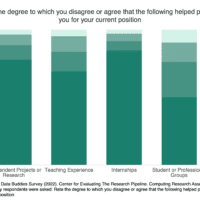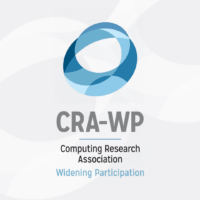Mentor and Student Applications to CRA-WP’s DREU Program Due February 15
By Ming C. Lin, University of Maryland at College Park
CRA-WP’s Distributed Research Experiences for Undergraduates (DREU) program is a research mentoring program that matches students with a faculty mentor for a summer research experience at the faculty mentor’s home institution. DREU interns have the opportunity to be directly involved in a research project and interact with graduate students and professors on a daily basis. This experience is invaluable for students who would like to learn more about what it’s like to do research and explore research careers. At the end of the summer, interns design a poster detailing their project, which can be submitted to conferences–such as GHC, Tapia, Great Minds in STEM, and SACNAS–for which they are eligible to receive funding to attend. Faculty mentors have the opportunity to work on their research project with new students from other institutions and to mentor future graduate students.
The DREU program is supported by the National Science Foundation (NSF) in partnership with other organizations, including the NSF-funded Alliance for Access to Computing Careers (AccessComputing) and the Institute for African-American Mentoring in Computer Sciences (iAAMCS).
DREU is firmly committed to broadening participation in computing, and over its nearly 30 years of existence has helped introduce more than a thousand undergraduates from groups minoritized in tech to computing research by matching them with a faculty mentor for a paid summer research experience.
Applications for mentors and students are due February 15, 2024.
Big Changes for 2024
Based on participant survey data, DREU has made significant updates for 2024, including refinements to the application and matching processes, as well as the resources DREU interns and mentors receive as a part of the program.
For mentors, for the first time this year DREU will accept applications from faculty from institutions without graduate programs. For interns, the program will encourage applications from students earlier in their academic career (e.g., rising sophomores) and from students with no prior research experience. In addition, the program will offer students the additional flexibility to stay at their home institution if they choose.
Read more about these changes in our article from November.
Positive Impact on Student Participants
The Computing Research Association’s (CRA) Center for Evaluating the Research Pipeline (CERP) evaluates the effectiveness of intervention programs designed to increase retention of individuals from underrepresented groups in computing, namely men from underrepresented racial/ethnic groups, and women of all racial/ethnic backgrounds. More generally, CERP strives to inform the computing community about patterns of entry, subjective experiences, persistence, and success among individuals involved in academic programs and careers related to computing.
Based on the latest CERP survey in 2022, DREU participants reported a statistically significant increase in their ability related to their research skills in writing or co-authoring a research paper or report. DREU participants reported stronger mentorship support, wherein they were more likely than before DREU to have a mentor who helped them improve their research skills and explore career options with them.
After completing the DREU program, participants felt that they knew more about the graduate school process, where they became more aware of career options in computing, knowing what it would be like to work in academia, and choosing the right program for them. Also, twice as many DREU students attended graduate school compared to other REU students.
For group comparisons, there were significant differences over time between groups for the measures of preparing graduate school application materials and having a strong network of peers to interact with at conferences. However, there were no significant differences over time between DREU participants and participants in CISE REUs in the measure of computing identity, feelings related to imposter syndrome, general job interests, highest degree intentions, and career aspirations.
In terms of team dynamics, DREU students felt their experience was “somewhat” collaborative on average, as 43 percent reported that they did not feel like they were competing with other undergraduates on the same project. Participants were more likely to agree that their mentors demonstrated professional integrity and content expertise in their research area. DREU students reported somewhat less satisfaction with the communication about the program, but they were more satisfied with having access to resources for their research projects than other REU sites.
Faculty Mentor Feedback
For the faculty mentors, CERP results indicate faculty mentors were satisfied with the DREU program. Faculty mentors reported the highest levels of satisfaction with the requirements expected of them (79%) and the amount of time needed to devote to the program (85%), indicating the DREU mentors found the current level of effort required of them reasonable.
Mentors reported connecting the DREU participants with current graduate students; speaking with them about graduate school details, such as the application process and degree options; and encouraging them to attend presentations and seminars related to the graduate school and professional development. All mentors who responded to the survey indicated they encouraged their students to consider graduate school options at least a moderate amount.
Furthermore, 64 percent of mentors indicated they prepared a research paper with their DREU students as co-authors. Additionally, 14 percent of mentors submitted a student co-authored paper proposal to a conference or journal and 43 percent submitted a student co-authored poster proposal to a conference. All mentors who had papers in preparation reported they had plans to continue communication with their DREU students after the summer ended.
About the Author:
Ming C. Lin is a Distinguished University Professor, Barry Mersky & Capital One Endowed Professor, and former Elizabeth Stevinson Iribe Chair of Computer Science at University of Maryland at College Park, and Parker Distinguished Professor Emerita of Computer Science at University of North Carolina (UNC) – Chapel Hill. She is also an Amazon Scholar. She received her B.S., M.S., Ph.D. degrees in EECS from University of California, Berkeley. Her research has been recognized by NSF Young Faculty Career Award, UNC Hettleman Award, IEEE VGTC VR Technical Achievement Award, Washington Academy of Sciences Distinguished Career Award, and several best paper awards.
She is a Fellow of National Academy of Inventors, ACM, IEEE, Eurographics, ACM SIGGRAPH Academy, and IEEE VR Academy. She is also a member of CRA and CRA-WP Board of Directors, EC of AsiaGraphics (AG), Chair of AG Awards Committee and IEEE Computer Society Goode Memorial Award Subcommittee, and a former Chair of IEEE CS Computer Pioneer Awards Committee, Fellows Committee, and Transactions Operations Committee, as well as the Founding Chair of ACM SIGGRAPH Outstanding Doctoral Dissertation Award Committee. She is an Editor-in-Chief-Emerita of IEEE Transactions on Visualization & Computer Graphics and a former IEEE CS Board of Governors member.









